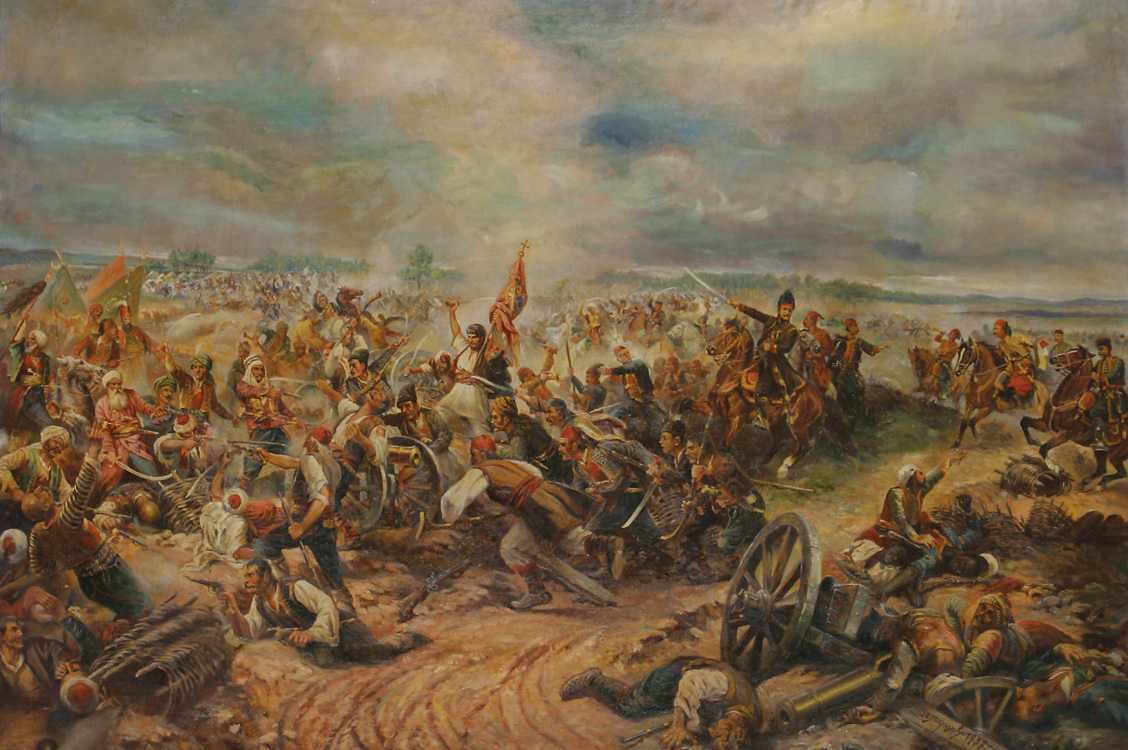The Greek revolt was part of the general movement of the Balkan nations for emancipation from their Turkish overlords. During the last quarter of the eighteenth century many peoples of the Balkan peninsula were awakening to a sense of national identity under the impact of French revolutionary and romantic ideas. They examined their national past with new interest and put particular stress on their native languages and on their Christian religion, which separated them from the Islamic Turks.
The first outbreak against the Turkish authorities came in 1804 among the Serbs, now one of the peoples of Yugoslavia. Ably led by Karadjordje Petrovic (c. 17521817), these early Serbian nationalists knew they would need outside help to win their independence. Some turned to Austria, which was nearby and ruled over their fellow Yugoslays, the Croats and Slovenes; others looked to distant Russia, which attracted them because it was both Slavic in language and Orthodox in religion, for the Serbs were Orthodox, unlike the other Yugoslays, who were Roman Catholic.
Thus was established a pattern of conflicting Austrian and Russian interests that ultimately erupted in World War I. Abandoned by the Russians in 1812, Karadjordje fled to Austria, and leadership of Serb nationalism passed to his rival, Milosh Obrenovich (1780-1860), who won Russian support and succeeded by 1830 in becoming prince of an autonomous Serbia. Although Milosh still paid tribute to the Ottoman emperor and a Turkish garrison remained in the Serb capital of Belgrade, a major step toward independence had been completed.
Meantime, the Greeks had launched a revolution. Leadership came from two groups—the Phanariot Greeks, named for the quarter where they lived in Istanbul, and the Island Greeks, merchants from the ports and islands of the Aegean. The Phanariots had long held positions of power and responsibility in governing the Orthodox subjects of the Ottoman Empire. Greek nationalists sponsored a campaign to purge the modern Greek language of its Turkish and Slavic words and to return it to the classical tongue of the Age of Pericles. A revolutionary secret society was formed in the Russian port of Odessa, patterned after the Carbonari of Italy and headed by Alexander Ypsilanti (1792-1828), a Phanariot who was an officer in the Russian army.
In 1821 Ypsilanti led an expedition into the Danubian provinces of the Ottoman Empire; it failed to stir up a major revolt. The conspirators were more successful in the Morea (the ancient Peloponnesus), where they launched a peasant uprising. The ensuing war for independence was a ferocious conflict.
The Morean peasants slaughtered every Turk they could find; the Ottoman government retaliated by killing or selling into slavery thirty thousand Greeks from the prosperous Aegean island of Chios. To help with the repression, the Ottoman sultan called in the forces of his vassals, especially the governor of Egypt. By 1827 when it appeared likely that the Egyptian expedition would recapture the last rebel strongholds, Britain, France, and Russia intervened to save the Greek independence movement at its darkest hour.
The three-power action resulted from the combined pressures of public opinion and strategic interests. In Britain, France, Germany, and the United States, the Philhellenic (pro-Greek) movement had won many supporters. Philhellenic committees sent supplies and money and demanded that their governments intervene directly. But intervention hinged on Russia, for Greek patriots had formed their secret society on Russian soil and with Russian backing.
Ultimately, Russia’s desire to dominate the Balkans won out over its concern for preserving the status quo, and it rallied openly to the Greek cause. Britain and France now felt obliged to take action because of Philhellenic pressure and, still more, because they feared to let Russia gain mastery over the Near East. A three-power intervention seemed the only course that would both rescue the Greeks and check the Russians.
Neither aim was fully achieved. In October 1827 Russian, British, and French squadrons sank the Turkish and Egyptian fleet. The subsequent Treaty of Adrianople (1829), while allowing Russia to annex outright only a little Turkish territory, arranged that the provinces of Moldavia and Wallachia should become a virtual Russian protectorate. After considerable wrangling, the European powers accorded formal recognition to a small independent Greek kingdom, which left most Greeks still within the Ottoman Empire.

